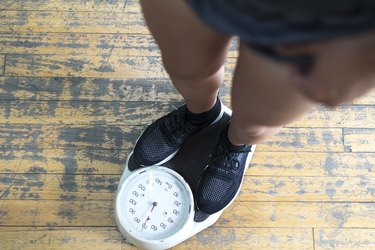
Hypoglycemia, or low blood sugar, is most common in people with diabetes, particularly if they are taking blood sugar-lowering medications such as insulin, according to the Mayo Clinic. It's important to prevent and manage low blood sugar, because uncontrolled blood sugar can have a number of adverse health effects — including unintended weight changes.
What Is Hypoglycemia?
Video of the Day
Hypoglycemia occurs when the body doesn't have enough blood sugar, aka glucose. Blood sugar is the body's main source of energy; it's created when the stomach breaks down the carbs in food, according to Kaiser Permanente. The hormone insulin helps move the glucose out of the bloodstream and into the cells, lowering blood sugar levels in the process. However, if too much glucose is removed from the blood or the body doesn't get enough carbs, blood sugars can drop below the healthy range.
Video of the Day
People with diabetes either don't produce enough insulin or can't use it effectively. This causes glucose to build up in their bloodstream, resulting in high blood sugar, or hyperglycemia. To correct this, people with diabetes often need to take blood sugar-lowering medications such as insulin. But if they take too much medication and/or don't consume enough food, it can result in low blood sugar, per the Mayo Clinic.
It may seem counterintuitive, but having high blood sugar can also cause low blood sugar several hours later. In this situation — called reactive hypoglycemia — the body releases too much insulin while trying to counteract high blood sugar (typically following a carb-heavy meal). This can cause low blood sugar within a few hours after eating, according to the Hormone Health Network.
Other causes of low blood sugar include skipping meals and exercising without eating enough.
Hypoglycemia and Weight Gain
People with hypoglycemia may find they gain weight because they use food to raise their blood sugar, Elizabeth Halprin, MD, clinical director of adult diabetes at Harvard's Joslin Diabetes Center, tells LIVESTRONG.com. "This means patients are eating more calories than they would normally."
Hunger is one of the classic symptoms of hypoglycemia; it's the body's way of signaling that it needs more energy. While the American Diabetes Association (ADA) recommends that patients treat low blood sugar with the "15-15 rule" (eating 15 grams of carbs, then waiting 15 minutes), the symptoms of hunger may cause a person to eat much more than that — increasing the possibility of weight gain.
And here's another thing: Any unused glucose gets stored in your body as fat. Consuming more calories than you need —no surprise here — result in weight gain, according to the Mayo Clinic. Avoiding low blood sugar — and the subsequent food cravings it causes — can help prevent this unintended weight gain.
Hypoglycemia and Weight Loss
"Hypoglycemia doesn't really cause weight loss," says Dr. Halprin. So if you're trying to lose weight with diabetes, low blood sugar is not the answer. As discussed, hypoglycemia can actually have the opposite effect and cause weight gain. Therefore, the best strategy for losing weight is to maintain healthy blood sugar levels and follow a nutritious, balanced diet, according to Harvard Medical School.
Preventing Hypoglycemia
If you are on medication for diabetes, follow your doctor's directions on how and when to take it. Be sure not to skip meals. Sticking to a healthy eating plan is also important in preventing the cycle of high and low blood sugar (and thus, unintended weight gain).
In general, it's wise to avoid simple and refined carbs such as those found in sugary foods, juices, sodas, white breads and white rice. These foods and beverages cause high blood sugar and are also often high in calories. It's best to only eat these foods if you need to treat low blood sugar, and then to only consume them in small quantities, per the ADA.
To prevent hypoglycemia, opt for complex carbs such as whole-grain breads and brown rice. Though these foods do elevate blood sugar levels, their fiber content slows the body's ability to convert the carbs in them into glucose, resulting in a steadier rise in blood sugar. Fiber also has the added benefit of contributing to a feeling of fullness, meaning that you're less likely to take in extra calories (and carbs) that might have an adverse effect on your weight.
Tip
Maintain stable blood sugar by eating plenty of fresh fruits and vegetables, some low-fat proteins (poultry, tofu, fish) and moderate amounts of healthy fats (nuts, olive oil, low-fat cheese), according to the Centers for Disease Control and Prevention (CDC). Like fiber, proteins and fat make it harder for the body to metabolize carbs into glucose, so eating carbs in combination with lean protein and healthy fat, instead of eating carbs alone, can help regulate your blood sugar. Having small, balanced meals throughout the day (instead of three big ones) is another good way to maintain steady blood sugar levels, per the CDC.
- Mayo Clinic: "Hypoglycemia"
- Kaiser Permanente: "How Our Bodies Turn Food Into Energy"
- Hormone Health Network: "Non Diabetic Hypoglycemia"
- American Diabetes Association: "Hypoglycemia (Low Blood Sugar)"
- Mayo Clinic: "Insulin and Weight Gain: Keep the Pounds Off"
- Harvard Health Publishing: "Diet & Weight Loss"
- Centers for Disease Control and Prevention: "Healthy Eating for a Healthy Weight"
Is this an emergency? If you are experiencing serious medical symptoms, please see the National Library of Medicine’s list of signs you need emergency medical attention or call 911.